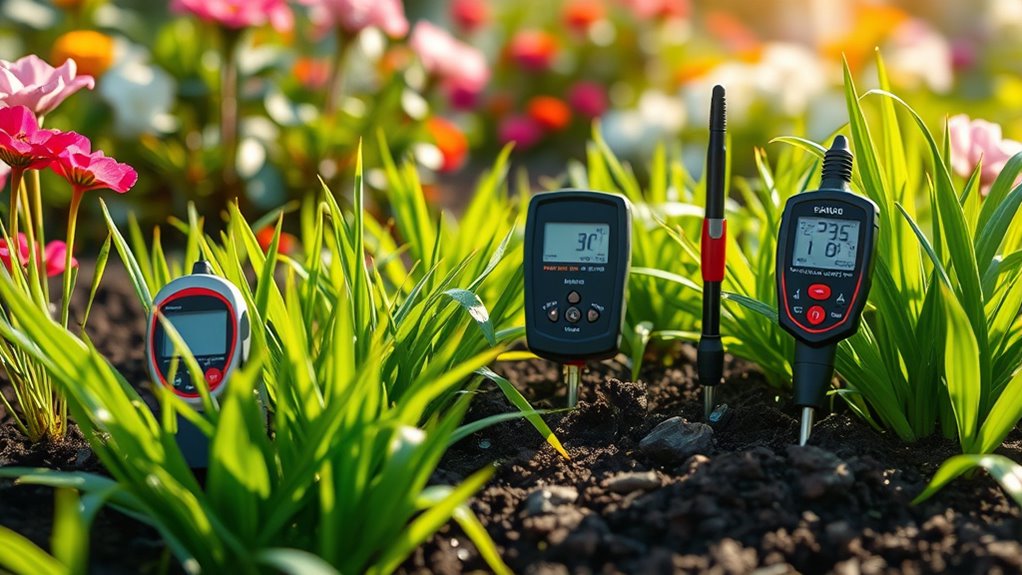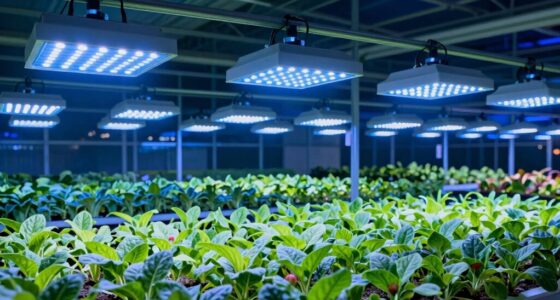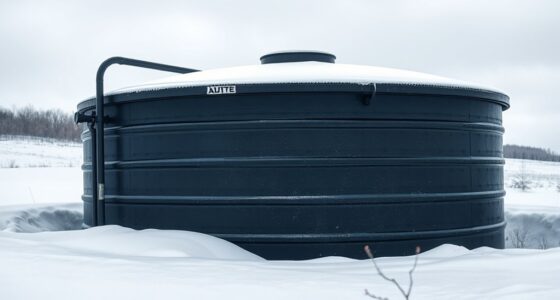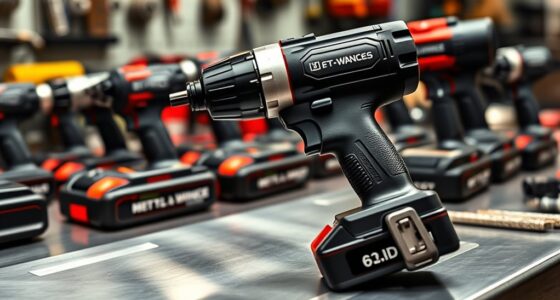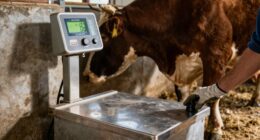If you’re looking for the best soil moisture meters to keep your garden healthy and your lawn lush, I recommend exploring a variety of options like mechanical tools, multi-parameter digital devices, and smart sensors. Some models focus solely on moisture, while others combine pH, light, and temperature measurements for all-encompassing care. Many are durable, easy to use, and require minimal maintenance—perfect for both beginners and experienced gardeners. Keep going, and you’ll discover the perfect fit for your gardening needs.
Key Takeaways
- Choose from simple mechanical models or advanced digital meters for accurate soil moisture readings.
- Consider multi-parameter testers that measure pH, light, and temperature for comprehensive soil health.
- Prioritize durable, waterproof designs with easy-to-clean probes suitable for outdoor use.
- Opt for user-friendly devices with backlit displays and minimal calibration for quick, reliable results.
- Match device features to your garden or lawn size for precise watering and optimal plant growth.
GROWIT Plant Moisture Meter for Houseplants
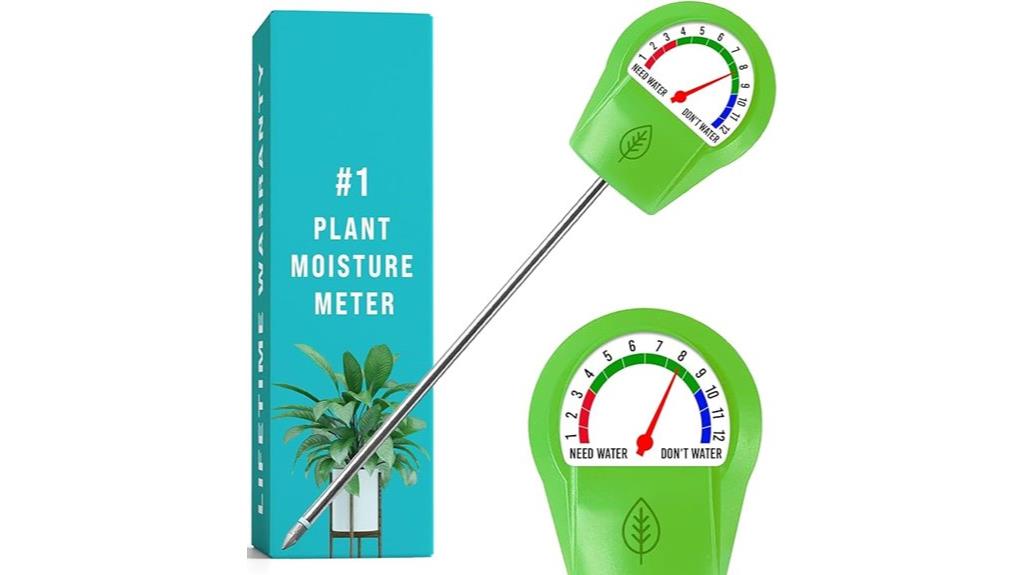
If you’re looking for an easy and reliable way to care for your indoor houseplants, the GROWIT Plant Moisture Meter is an excellent choice. I appreciate how quickly and accurately it measures soil moisture, helping me avoid overwatering or underwatering. Simply insert the probe into the soil, and I get an instant reading—no batteries needed, which is a big plus. Its compact size makes it portable and easy to handle, and I find it durable enough to last through many uses. Plus, cleaning is a breeze with a dry paper towel. For both beginners and seasoned gardeners, it’s a simple tool that truly supports healthy plant growth.
Best For: indoor houseplant enthusiasts, beginner gardeners, and experienced plant owners seeking an easy, accurate moisture monitoring tool.
Pros:
- Easy to use with instant readings; no batteries required.
- Compact and portable design for convenient handling and storage.
- Durable construction and simple cleaning with a dry paper towel.
Cons:
- Occasional variability in readings depending on soil type and plant conditions.
- Limited to moisture measurement; does not provide other soil health metrics.
- May require recalibration or additional tools for comprehensive plant care.
3-in-1 Soil Test Kit (Soil Moisture, pH & Fertility Meter)
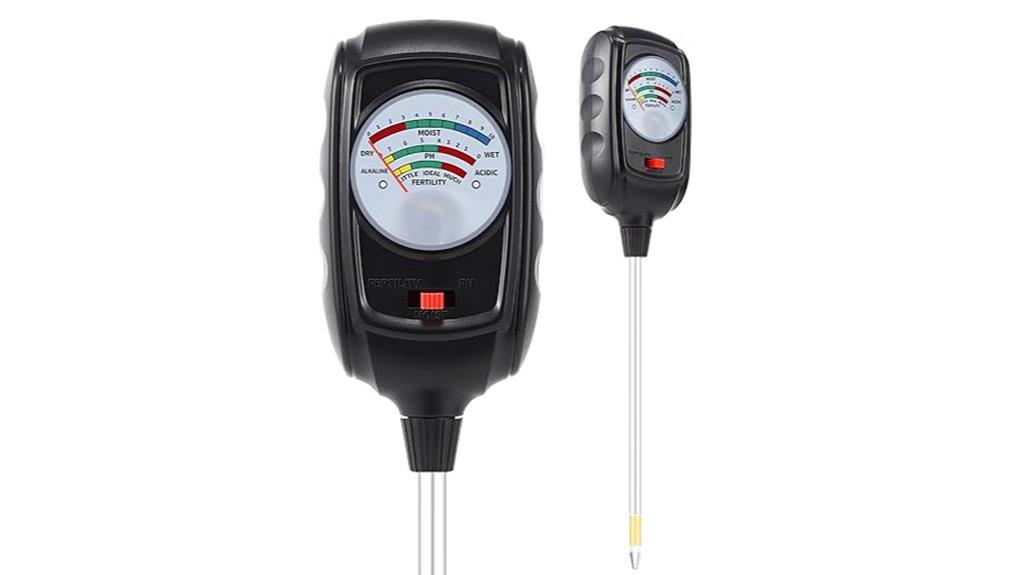
The in-1 Soil Test Kit stands out as an excellent choice for gardeners and small-scale farmers seeking an all-in-one solution to monitor soil health. It combines soil moisture, pH, and fertility testing in a single device, making it versatile and convenient. The metal probe delivers quick, accurate readings without batteries, and the pointer provides clear results. It’s easy to use—simply insert the probe into soil, wait a few minutes, and read the measurement. Perfect for indoor and outdoor use, it helps optimize watering, pH balance, and soil nutrients, promoting healthier plants and more productive gardens.
Best For: home gardeners, small-scale farmers, and indoor plant enthusiasts seeking an all-in-one, easy-to-use soil testing solution to optimize plant health.
Pros:
- Combines soil moisture, pH, and fertility testing in a single, convenient device.
- No batteries required; provides quick and accurate readings with a clear pointer.
- Suitable for both indoor and outdoor use, helping optimize watering and soil conditions.
Cons:
- Less sensitive than higher-end models, which may affect precision.
- Not suitable for testing water, rocky, very hard, sandy, or loose soil.
- Some users report inconsistent readings or difficulty reading the needle in certain conditions.
4-in-1 Soil Moisture Meter with pH, Temperature & Light for Plants
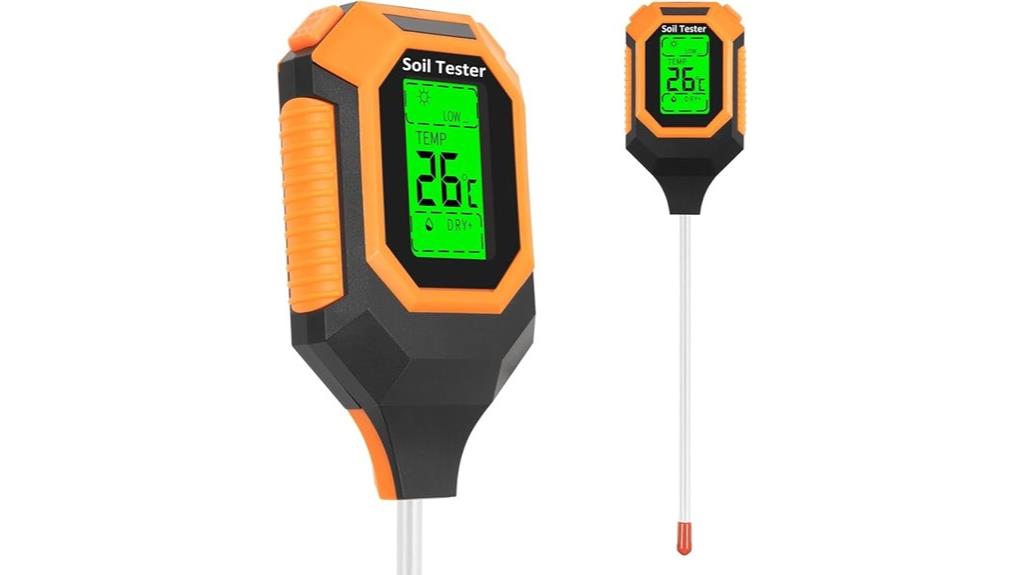
For gardeners and plant enthusiasts seeking a thorough, easy-to-use tool, the in-1 Soil Moisture Meter with pH, Temperature, and Light offers an ideal solution. This digital device provides quick, accurate readings of soil pH, moisture, temperature, and light levels, all on a large backlit LCD display. Its simple design features just two buttons, making it perfect for beginners. Just insert the probe into soil, wait a few seconds, and get reliable data to optimize watering, fertilizing, and lighting. Its sturdy build and advanced detection technology ensure consistent results, helping you maintain healthier plants and vibrant gardens with minimal effort.
Best For: gardeners, indoor plant owners, and farmers seeking an easy-to-use, all-in-one soil testing device for accurate plant care.
Pros:
- Provides quick and precise readings of soil pH, moisture, temperature, and light levels with a large backlit LCD display.
- Simple operation with only two buttons, making it beginner-friendly and easy to use.
- Durable build with advanced detection technology ensures consistent and reliable results.
Cons:
- Requires three AAA batteries (not included), which may be an inconvenience for some users.
- The probe needs to be inserted about 3-5 inches into soil, which may be challenging in very rocky or compacted soil.
- Some users have noted a desire for adjustable screen angles or retained settings for enhanced convenience.
4-in-1 Soil Moisture Meter for Gardening and Farming
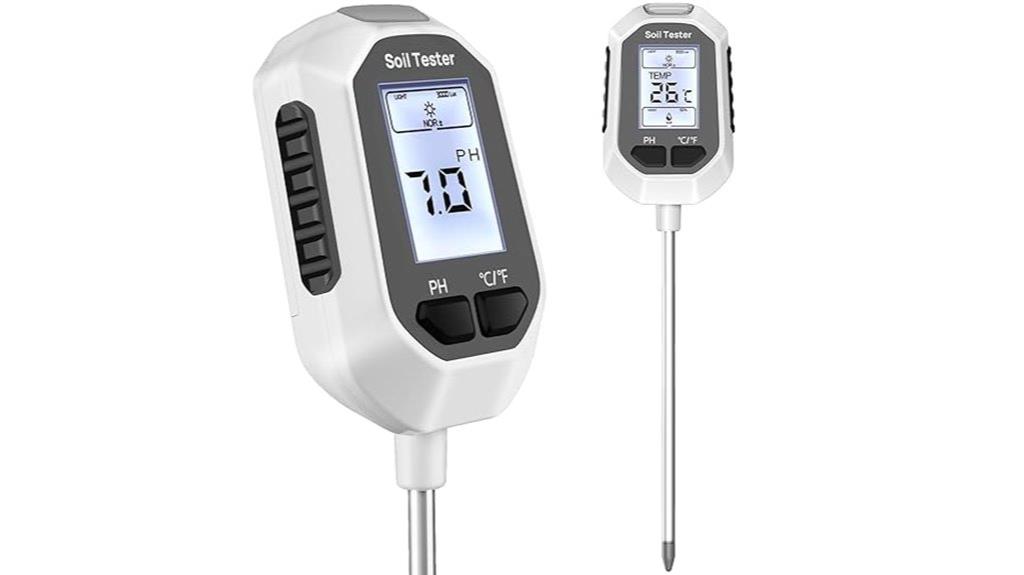
A 4-in-1 soil moisture meter stands out as an excellent choice for gardeners and farmers seeking an all-encompassing tool to monitor soil conditions. It measures moisture, pH, temperature, and sunlight intensity, providing extensive insight into soil health. The large LCD with backlight makes readings easy to see day or night, and the tilting head design offers better visibility without bending. It’s suitable for indoor and outdoor use, whether in gardens, farms, or potted plants. With quick, accurate results, it helps optimize watering, pH adjustments, and light management, supporting healthier plants and more productive farming. Its user-friendly design makes it accessible for beginners and experienced growers alike.
Best For: home gardeners, farmers, and plant enthusiasts seeking an all-in-one soil testing tool for indoor and outdoor use to optimize plant health and growth.
Pros:
- Measures soil moisture, pH, temperature, and sunlight with a single device for comprehensive soil analysis.
- Large LCD with backlight and tilting head design ensure easy reading in any lighting condition.
- Portable and user-friendly, suitable for beginners and experienced growers alike.
Cons:
- Accuracy can vary depending on soil type and probe placement, requiring multiple measurements for reliable data.
- Light sensor may be less effective under artificial lighting or indoor environments.
- Some buttons may be unintuitive, and the device is not waterproof, limiting its use in wet conditions.
XLUX Soil Moisture Meter for Gardening and Farming
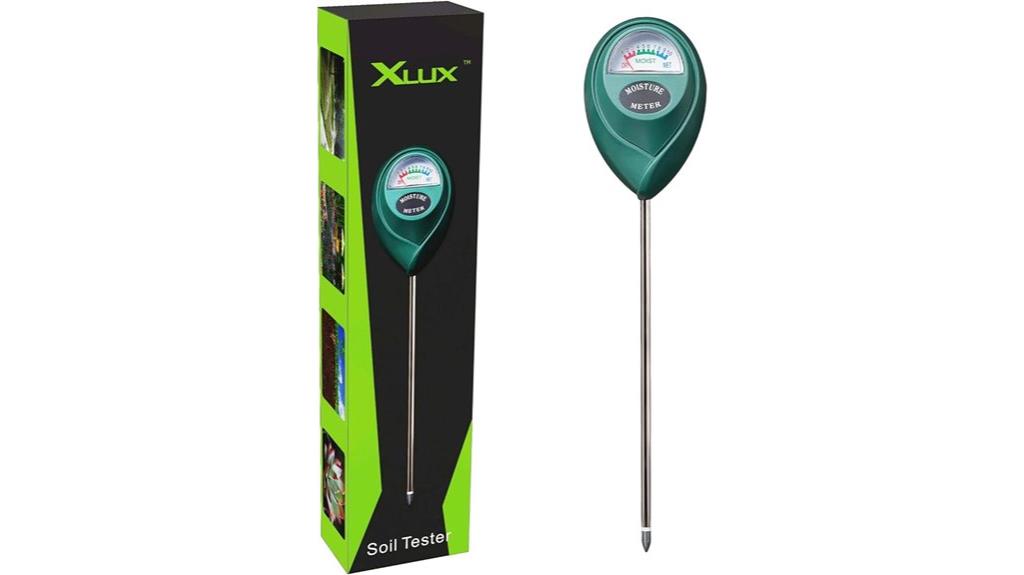
If you’re seeking a reliable, battery-free tool to monitor soil moisture accurately, the XLUX Soil Moisture Meter is an excellent choice. I appreciate its mechanical design, which eliminates electronic failures, making it durable and easy to use. The large dial provides instant readings—dry, moist, or wet—helping me determine watering needs without guesswork. Its small probe minimizes root damage, and I can measure soil at various angles. I find it especially useful for potted plants and garden beds, giving deep insights into soil conditions. Overall, it’s simple, effective, and perfect for gardeners and farmers who want quick, reliable moisture readings.
Best For: gardeners and farmers seeking a reliable, battery-free soil moisture testing tool for indoor and outdoor plants to prevent overwatering and underwatering.
Pros:
- Mechanical and battery-free design ensures durability and eliminates electronic failure points
- Provides instant, easy-to-read moisture levels at various soil depths and angles
- Compact, lightweight, and easy to use for different plant types and garden setups
Cons:
- Not suitable for testing water or very hard, compacted soil conditions
- Requires regular cleaning to maintain accuracy and prevent corrosion
- Moisture readings can vary within pots, so multiple measurements may be necessary for precise assessment
VIVOSUN Soil Tester 3-in-1 Plant Moisture, Light & pH Meter
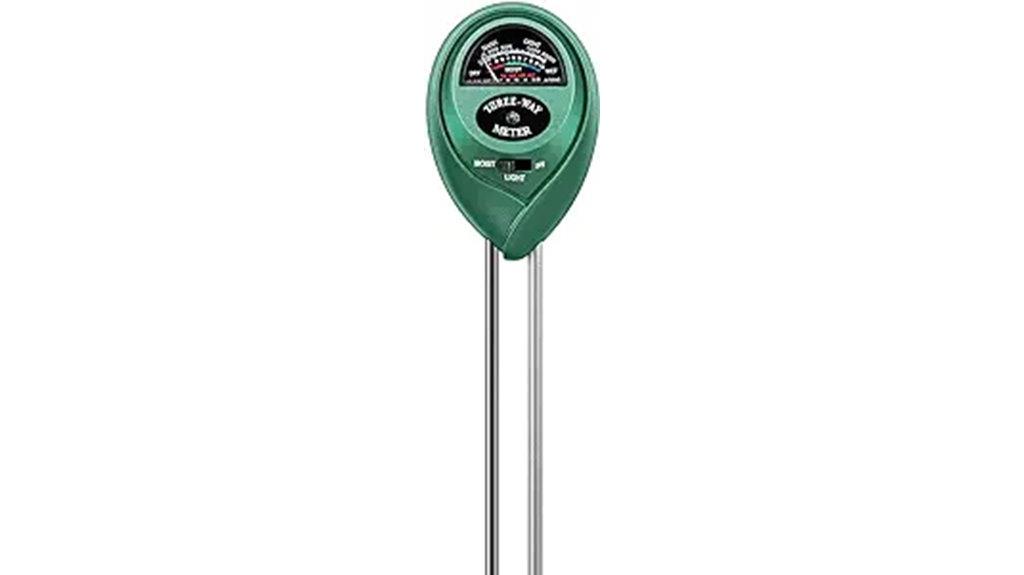
The VIVOSUN Soil Tester 3-in-1 is an excellent choice for home gardeners and hobbyists who want quick, reliable insights into their soil’s moisture, light, and pH levels without the hassle of complex equipment. Its compact design and one-button operation make testing straightforward, whether you’re indoors or outdoors. It measures moisture (1-10), light (0-2000), and pH (3.5-8), helping you optimize watering, lighting, and soil adjustments. No batteries are needed, making it portable and easy to use anytime. While some users report minor inaccuracies, overall, it’s a practical, affordable tool that simplifies soil testing for healthy plant growth.
Best For: casual gardeners and hobbyists seeking an affordable, easy-to-use soil testing tool for monitoring moisture, light, and pH levels indoors or outdoors.
Pros:
- Simple one-button operation for quick testing
- No batteries required, portable and convenient
- Accurate enough for basic soil condition assessments
Cons:
- Inconsistent pH and light readings in certain soil types
- Not suitable for precise scientific or hydroponic use
- Packaging issues reported by some users affecting reliability
GROWIT Soil Moisture Meter for Plants

For gardeners seeking an easy, battery-free way to monitor soil moisture, the GROWIT Soil Moisture Meter for Plants is an excellent choice. Compact and reliable, it measures soil moisture without batteries, helping prevent overwatering and root rot. Its simple design allows for quick, accurate readings, indicating whether soil is wet, dry, or in-between. The device is easy to clean and maintain, with a helpful QR code watering guide for beginners. Rated 4.4 stars from nearly 300 reviews, users appreciate its affordability and effectiveness in keeping plants healthy. Just remember to wipe it after use to avoid rust and ensure accurate results.
Best For: beginner gardeners and indoor plant enthusiasts seeking a simple, battery-free soil moisture monitoring tool to maintain healthy watering habits.
Pros:
- Easy to use with quick, reliable moisture readings without batteries
- Compact, lightweight, and simple design suitable for indoor and outdoor use
- Includes a QR code watering guide, perfect for beginners learning proper watering techniques
Cons:
- Susceptible to rust if not wiped dry after use, affecting durability
- Some users report device malfunctions or inconsistent readings over time
- Slight discrepancies between product images and actual units received, leading to possible confusion
4-in-1 Soil Moisture Meter for Gardening and Farming
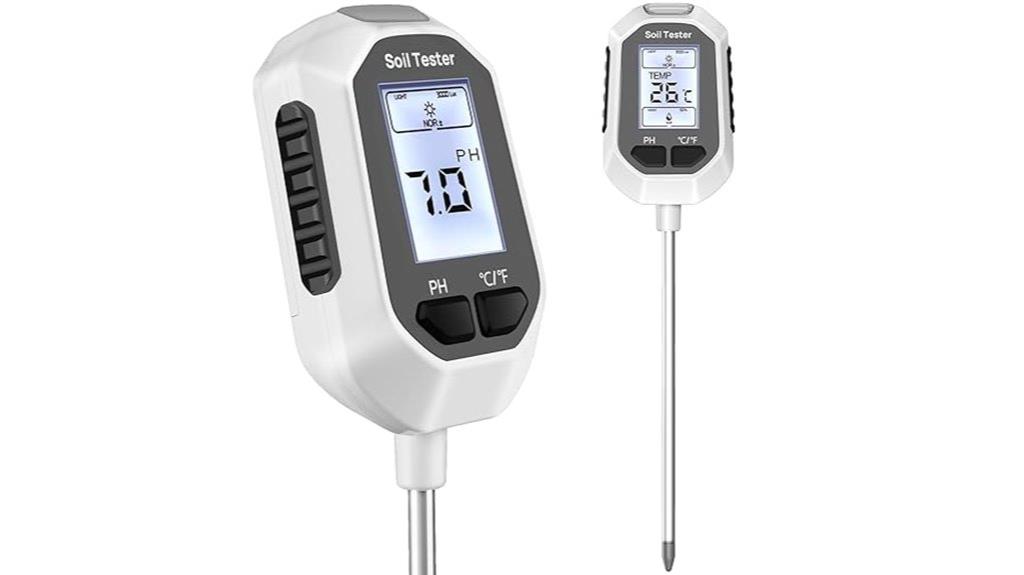
A 4-in-1 soil moisture meter stands out as an ideal tool for gardeners and farmers who want all-encompassing insights into their soil conditions. This device measures soil moisture, pH, temperature, and sunlight, giving you a thorough understanding of your plants’ needs. Its large LCD with backlight ensures easy reading day or night, and the tilting head design improves visibility without bending. Suitable for indoor and outdoor use, it’s perfect for gardens, farms, and potted plants. With quick, accurate readings, it helps optimize watering, pH balance, and light exposure, it promotes healthier plants and more productive gardening.
Best For: home gardeners, professional farmers, and plant enthusiasts seeking comprehensive soil analysis for healthy, thriving plants.
Pros:
- Measures multiple soil parameters (moisture, pH, temperature, sunlight) for all-in-one plant care.
- Large LCD with backlight and tilting head for easy reading in any lighting condition.
- Suitable for both indoor and outdoor use, enhancing versatility across various gardening environments.
Cons:
- Accuracy can vary depending on soil type, depth, and environmental factors.
- Light sensor may be unreliable under artificial lighting or indoor conditions.
- Some users find the button operation and calibration process less intuitive, affecting ease of use.
Soil Moisture Meter for Plants
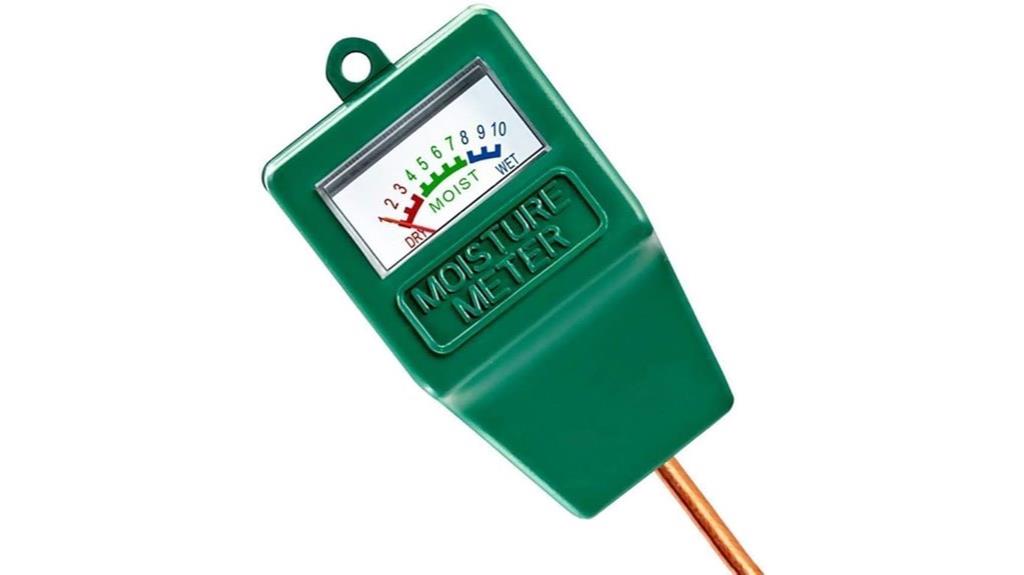
If you’re looking for an easy-to-use tool to keep your plants healthy, a soil moisture meter with a single probe is an excellent choice. Its 7.6-inch long probe fits deep into soil, making it suitable for large pots and outdoor beds. No batteries or electricity are needed—just insert the probe at root level, and the dial instantly shows moisture levels. It’s lightweight, portable, and simple to clean with a damp cloth. The sensitive sensor provides quick, accurate readings, helping you avoid overwatering or underwatering. Many users find it a reliable, low-maintenance tool that improves plant care and healthier growth.
Best For: indoor and outdoor plant enthusiasts seeking an easy, reliable way to monitor soil moisture and prevent over or underwatering.
Pros:
- Simple to use with instant moisture readings without batteries or electricity
- Suitable for deep soil in large pots and outdoor beds due to the 7.6-inch probe
- Lightweight, portable, and easy to clean, making it ideal for frequent use
Cons:
- Not designed for testing water or liquids, limiting its versatility
- Some users report potential durability issues or defects upon arrival
- May require careful handling to avoid touching stones or damaging the probe during use
Luster Leaf 1820 Rapitest Soil Moisture Meter
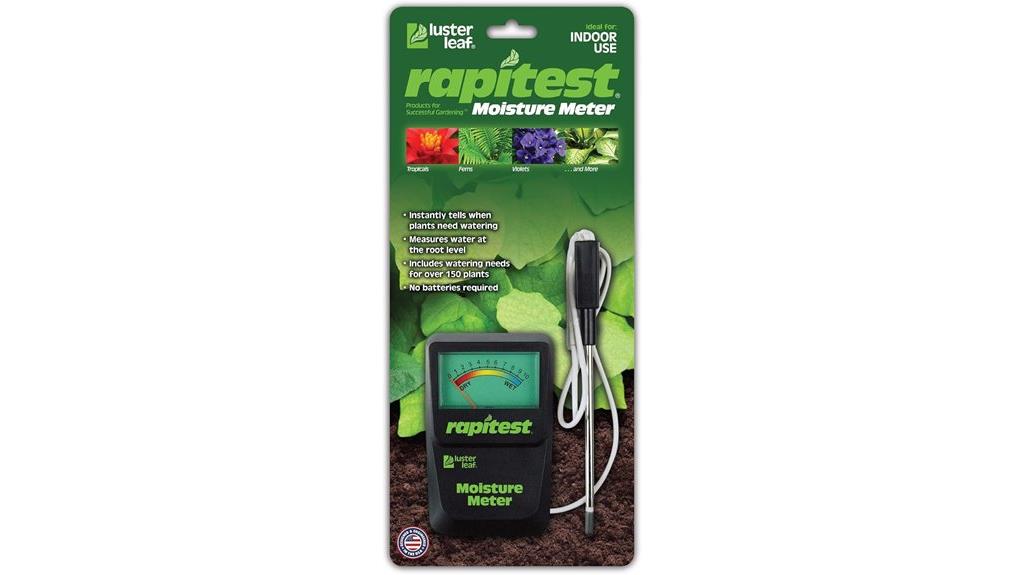
The Luster Leaf 1820 Rapitest Soil Moisture Meter stands out as an ideal choice for both beginner and experienced gardeners who want quick, accurate readings at root level. Its stainless steel probe measures soil moisture instantly on a 1-10 scale, helping you determine when your plants need water. No batteries are required, and it’s simple to use—just insert the probe fully into the soil. It’s lightweight and easy to read, making it perfect for hanging baskets and pots. With plant-specific guidelines and a reliable reputation, this meter helps prevent overwatering and underwatering, ensuring healthier, more vibrant plants with minimal effort.
Best For: both novice and experienced gardeners seeking quick, accurate soil moisture readings at root level to maintain healthy plants with minimal effort.
Pros:
- Measures soil moisture instantly on a clear 1-10 scale, aiding precise watering decisions
- No batteries required, making it convenient and low-maintenance
- Easy-to-read display and lightweight design suitable for hanging baskets and pots
Cons:
- Probe may be flimsy or require firm insertion, which can be challenging for some users
- Initial inaccuracies if instructions aren’t followed, such as proper cleaning and insertion depth
- Sensitive probe necessitates careful handling to ensure longevity and consistent accuracy
Soil pH Meter (MS02 3-in-1 Soil Moisture/Light/pH Tester)
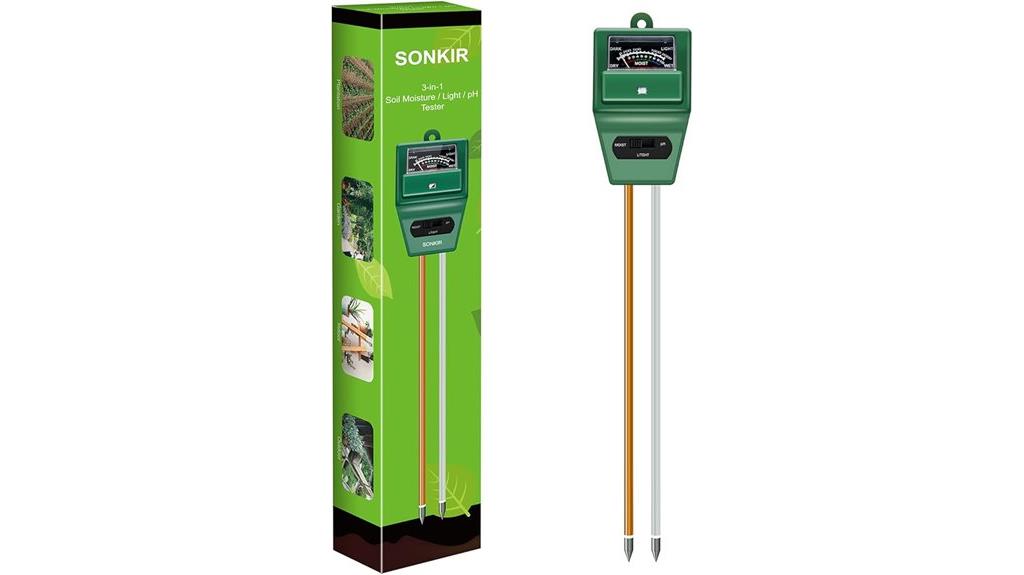
For gardeners seeking an all-in-one tool, the Soil pH Meter MS02 stands out because it combines soil moisture, light, and pH measurements into a compact, battery-free device. You just insert the probes into the soil, wait a few minutes, and read the results directly on the panel. Its sturdy design ensures durability for outdoor or indoor use, making it versatile for garden beds, lawns, or containers. While it’s easy to operate, keep in mind that readings can be less accurate in very dry soil or if probes aren’t properly cleaned. Overall, it’s a convenient, cost-effective choice for those wanting quick, multi-parameter soil analysis.
Best For: home gardeners, indoor plant enthusiasts, and small-scale farmers seeking an easy-to-use, all-in-one soil testing tool without batteries.
Pros:
- Combines moisture, pH, and light measurements in a single compact device for versatile soil analysis.
- No batteries required, making it convenient and low-maintenance.
- Durable, portable design suitable for outdoor and indoor use in various gardening settings.
Cons:
- Less accurate in very dry soil or if probes are not properly cleaned after use.
- Possible calibration issues, such as pH readings getting stuck at high alkalinity levels.
- Some users report sensitivity to transit damage or difficulty obtaining replacement support.
Soil Moisture Meter Long Stem 2 Pack
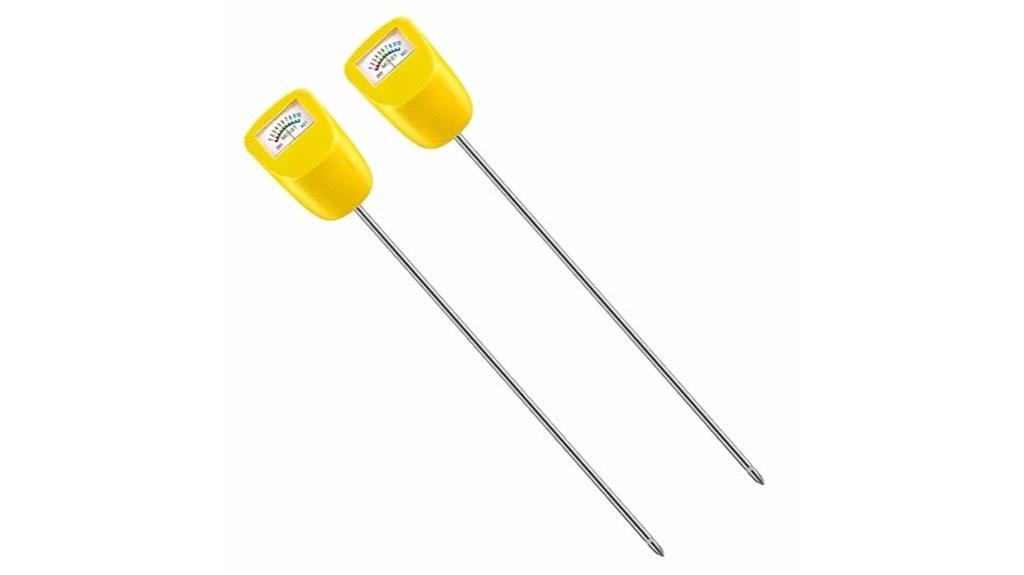
A two-pack of soil moisture meters with long stems is perfect for gardeners managing multiple plants or large garden beds. The TFTEK Soil Moisture Meter offers precise readings beyond surface checks, thanks to its 5.5-inch probe that reaches deep into soil. Its large dial with clear zones makes reading quick and easy, while the single probe minimizes root disturbance. Made with durable, lightweight materials, it’s easy to handle and suitable for various pots and beds. Having two meters allows monitoring different areas simultaneously, helping you water more accurately and prevent over- or underwatering, ensuring healthier plants and more efficient garden care.
Best For: gardeners managing multiple plants or large garden beds who need accurate, deep soil moisture readings to maintain optimal plant health.
Pros:
- Provides precise moisture readings beyond surface checks with a 5.5-inch probe suitable for deep soil measurement
- Large, easy-to-read dial with clear zones for quick interpretation
- Dual pack allows monitoring multiple plants or areas simultaneously, improving watering accuracy
Cons:
- Some users report durability issues, with meters not lasting beyond a season
- Probe may bend or break if used with hard or rocky soil, requiring gentle handling
- Regular maintenance needed, such as wiping clean after use, to prevent corrosion and extend lifespan
5-in-1 EarthScout Soil Moisture Meter for Farming and Gardening
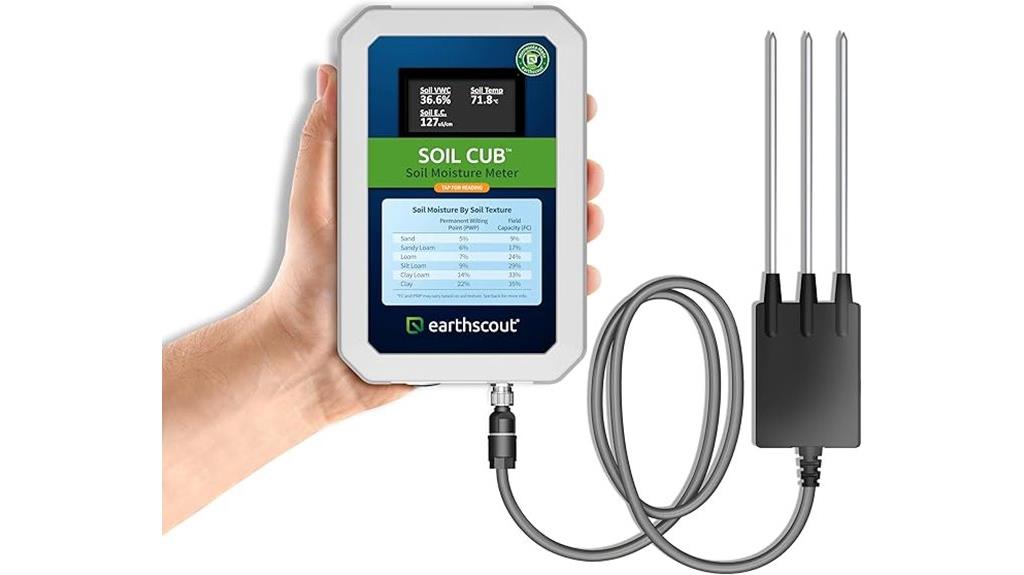
Farmers, gardeners, and researchers seeking accurate, real-time soil data will find the EarthScout 5-in-1 Soil Cub an invaluable tool. This commercial-grade device measures soil moisture, temperature, electroconductivity, air temperature, and humidity instantly. Simply insert the sensor into soil or turf, tap the screen, and compare the readings to field capacity charts for your soil type. With Time Domain Reflectometry (TDR) technology, it offers research-grade accuracy and durability, even in tough outdoor conditions. Powered by 6 AA batteries, it’s portable and reliable. Its compact design and waterproof construction make it ideal for farms, gardens, and research projects, ensuring precise data whenever you need it.
Best For: farmers, gardeners, and researchers who need accurate, real-time soil data for optimal crop and plant management.
Pros:
- Provides instant, multi-parameter soil readings including moisture, temperature, and electroconductivity with research-grade accuracy.
- Durable, waterproof construction suitable for tough outdoor environments and extended field use.
- Portable design powered by 6 AA batteries, making it easy to use in various locations without external power sources.
Cons:
- Relatively high cost compared to basic soil moisture meters, which may be a consideration for casual users.
- Requires understanding of soil type charts and proper insertion techniques for accurate readings, which may have a learning curve.
- Limited to 6 AA batteries, which need replacement over time and may impact long-term operational costs.
THIRDREALITY Smart Soil Moisture Sensor 3Pack
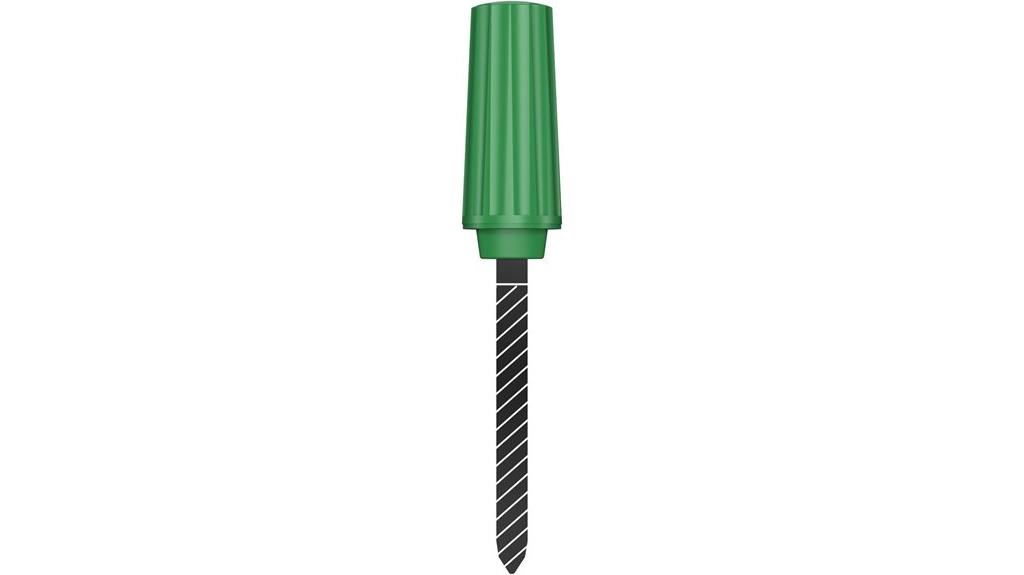
If you’re looking to optimize your garden’s health with reliable soil monitoring, the THIRDREALITY Smart Soil Moisture Sensor 3Pack is an excellent choice, especially if you already have a compatible Zigbee hub. These sensors provide real-time moisture and temperature readings, accessible remotely via your smartphone. They support automation, allowing you to set watering schedules that ensure your plants get the right amount of water. Built with capacitive sensing probes, they’re durable and less affected by soil salinity or pH. Designed for versatile use—be it gardens, greenhouses, or potted plants—they integrate seamlessly with systems like SmartThings, Hubitat, and Home Assistant.
Best For: gardeners and horticulturists seeking reliable, real-time soil moisture monitoring and automation integration with compatible Zigbee smart home systems.
Pros:
- Provides accurate, real-time soil moisture and temperature readings with capacitive sensing probes.
- Supports seamless integration with popular smart home platforms like SmartThings, Hubitat, and Home Assistant.
- Enables remote monitoring and automated watering schedules, promoting healthy plant growth and saving time.
Cons:
- Requires a Zigbee hub for operation; not a standalone device.
- Not compatible with Alexa Echo devices for voice control.
- Smart Bridge MZ1 needed for Apple Home or Google Home compatibility, sold separately.
XLUX Long Probe Soil Moisture Meter Sensor (2 Pack)
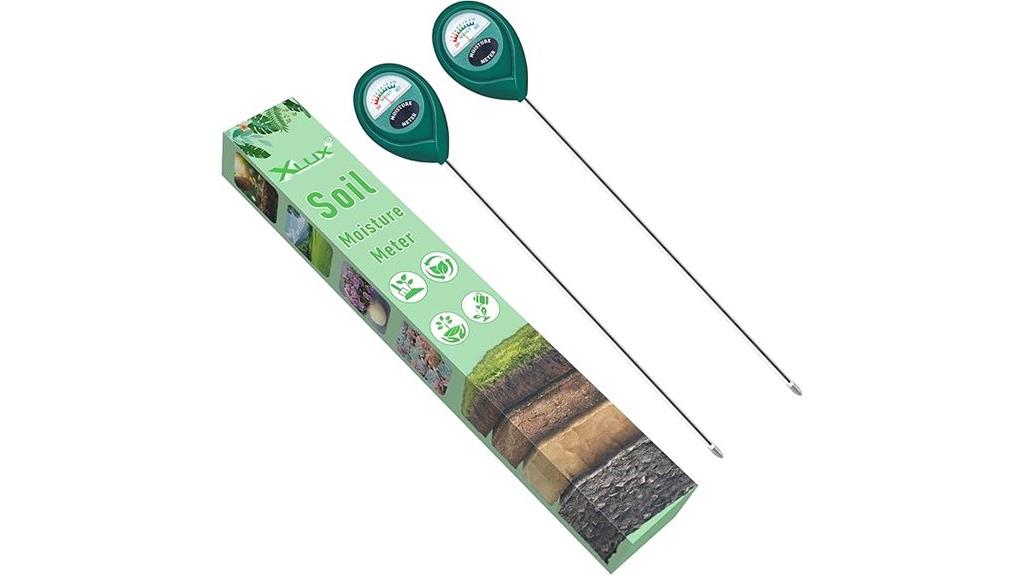
The XLUX Long Probe Soil Moisture Meter Sensor (2 Pack) is ideal for gardeners and plant enthusiasts who need to test soil at greater depths without disturbing roots. Its 5.5-inch probe reaches deep into soil, making it perfect for large pots, outdoor beds, and farm fields. The large dial provides instant, easy-to-understand readings across three zones and ten scales, helping you determine when plants need watering. Designed with a single probe, it minimizes root damage and soil disturbance. Durable and suitable for various soil types, this tool is simple to clean and store, offering reliable moisture detection for healthier plants and better watering practices.
Best For: gardeners, farmers, and plant enthusiasts who need to accurately test soil moisture at greater depths without disturbing roots.
Pros:
- Long 5.5-inch probe allows for deep soil testing in large pots and outdoor beds
- Easy-to-read dial provides instant, clear moisture readings across multiple zones and scales
- Durable design minimizes root damage and is suitable for various soil types, with simple cleaning and storage
Cons:
- Not suitable for testing water or very hard soil conditions
- Occasional issues with malfunction or inconsistent readings if not properly cleaned or maintained
- Limited to soil moisture detection; does not measure other soil parameters like pH or nutrients
Factors to Consider When Choosing Soil Moisture Meters

When selecting a soil moisture meter, I consider several key factors to guarantee it meets my needs. I look at measurement accuracy, soil compatibility, ease of use, durability, and how often it requires maintenance. These points help me choose a reliable tool that provides precise readings and lasts over time.
Measurement Accuracy and Precision
Choosing a soil moisture meter that delivers accurate and precise readings depends on understanding how various factors influence measurement quality. Sensitive probes and reliable sensing technologies, like capacitive or TDR sensors, are key to accuracy. Precision relies on proper probe insertion, including depth and angle, and consistent testing methods across different soil types. Regular calibration and maintenance, such as cleaning probes and verifying readings against known moisture levels, also improve reliability. Soil composition, including salinity and texture, can affect sensor performance, so selecting a meter suited to your soil is important. Digital meters often offer better consistency than analog ones, but always check their accuracy specifications. Ultimately, careful operation and maintenance are essential to get the most reliable, precise moisture readings for healthy gardening.
Soil Compatibility and Depth
Selecting a soil moisture meter that fits your soil type is essential for obtaining accurate readings. Sandy, loamy, or clay soils each have different moisture retention properties, so choosing a compatible meter guarantees reliable results. Consider the probe length—deep beds or large pots require longer or adjustable probes to measure at the correct depth. If you need to monitor multiple layers, opt for a meter with extendable or adjustable probes. Keep in mind that traditional analog meters often have limited depth capacity, while digital or models with extended probes can reach deeper soil profiles. Additionally, select a design that allows easy insertion without damaging roots or disturbing the soil structure at your desired measurement depth.
Ease of Use and Design
A soil moisture meter that’s easy to use makes all the difference in maintaining healthy plants. I look for models with intuitive interfaces, like clear dials or bright digital displays, so I can read results quickly without fuss. Durability matters too—rust-resistant probes and sturdy housings guarantee it withstands regular use in different soils. Ergonomic design, such as comfortable grips and easy probe insertion, helps, especially if I need to check multiple spots or have limited strength. Compact and lightweight meters are a plus, making them portable and simple to store. Clear markings, color-coded zones, or backlit screens improve readability in any lighting, so I always get accurate readings. An easy-to-use design saves time and reduces frustration, making soil testing straightforward and effective.
Durability and Material Quality
When evaluating soil moisture meters, durability and material quality are critical factors that determine how well the device will perform over time. High-quality meters are built from corrosion-resistant materials like stainless steel or tough plastics, ensuring they withstand soil, moisture, and environmental exposure. Metal probes generally last longer than plastic ones, providing better durability and resistance to wear. The material quality also impacts resistance to rust, UV damage, and degradation from dirt and debris. Well-designed meters feature reinforced joints and sealed components to protect internal parts, maintaining consistent accuracy. Investing in a device with robust materials extends its lifespan, reduces the need for frequent replacements, and ensures reliable readings season after season. Durability is key to getting the most value from your soil moisture meter.
Power Source and Maintenance
Choosing the right power source for your soil moisture meter is essential for reliable and hassle-free use. Battery-powered meters are common, but they require periodic battery replacements or recharging, which can add to maintenance. Rechargeable models reduce ongoing costs and are eco-friendly, but they still need charging, so keep an eye on battery life. Analog meters, often battery-free and relying on manual mechanisms, need minimal upkeep and are very low-maintenance. Proper storage is key—keep your device dry and away from extreme temperatures to prolong its lifespan and keep readings accurate. Selecting a meter with accessible batteries or low-maintenance power options can save you time and money, making your gardening experience smoother and more reliable over the long term.
Price and Value Offers
Ever wondered how to get the best value out of your soil moisture meter? Comparing prices across brands is key to making a smart choice within your budget. You don’t need to spend a fortune—many affordable models deliver reliable performance, perfect for casual gardeners who want accuracy without breaking the bank. On the other hand, higher-priced meters often come with extra features or improved durability, which can be worth it if you’re serious about extensive or professional gardening. Look for bundle deals or multi-packs, as they can offer better overall value for monitoring multiple plants or garden sections. Additionally, checking warranty options and customer support can ensure your investment remains protected and dependable over time.
Additional Features and Compatibility
Considering the range of additional features and compatibility options can considerably enhance your soil moisture meter’s usefulness, especially if you want a device that integrates seamlessly with your existing gardening setup. Compatibility with smart home systems like Zigbee, Wi-Fi, or Bluetooth allows for easy integration and expanded functionality. Features such as pH, temperature, and light measurement provide a complete soil profile, helping you make better-informed decisions. Some meters support remote monitoring through mobile apps or sensors, offering real-time data and automated watering adjustments. Usability can also be improved with digital displays, backlit screens, or compatibility with specific devices, making readings clear in various lighting conditions. Keep connectivity requirements in mind, as some devices need hubs or specific app support for smooth operation.
Frequently Asked Questions
How Often Should I Test My Soil Moisture Levels?
You’re wondering how often to test your soil moisture levels, right? I recommend checking your soil at least once a week, especially during growing seasons or drought periods. If you’re watering regularly, testing every few days helps prevent overwatering or underwatering. Keep an eye on weather conditions too—after heavy rains or heatwaves, a quick moisture check guarantees your plants stay healthy and hydrated.
Can Soil Moisture Meters Work for All Soil Types?
Think of soil moisture meters as keys opening different doors; they can work across various soil types, but some keys fit better than others. I’ve found that most meters do a decent job in diverse soils, yet their accuracy can vary—clay, sandy, or loamy. For the best results, I choose meters with adjustable settings or multiple probes, ensuring I get reliable readings no matter what kind of soil I’m working with.
Do These Meters Require Calibration Before Use?
I’ve found that most soil moisture meters don’t need calibration before use, especially if they’re digital or come with clear instructions. However, some analog models might require a quick calibration to guarantee accuracy, particularly with different soil types. I recommend reading the manufacturer’s guidelines to see if calibration is needed and to get the best readings for your garden or lawn.
Are Digital or Analog Meters More Accurate?
Imagine a tiny gauge in your hand, whispering secrets about your soil’s moisture. I find digital meters more accurate because they provide precise readings instantly, like a clear window into your garden’s needs. Analog meters are charming and simple but can be less consistent. For the best results, I recommend digital, especially if you’re aiming for healthy plants and lush lawns.
How Deep Can These Soil Moisture Sensors Measure?
You’re wondering how deep soil moisture sensors can measure. I’ve found that most sensors typically measure between 3 to 12 inches deep, depending on the model. Some advanced probes can go even further, up to 24 inches or more, giving a better picture of moisture levels at different soil depths. It’s essential to choose a sensor that matches your gardening needs for peak results.
Conclusion
Choosing the right soil moisture meter transforms gardening from guesswork to confidence. Whether it’s a simple probe or a high-tech sensor, the right tool makes all the difference. It’s not just about accurate readings but about nurturing your plants with care. So, don’t overlook the importance of quality. After all, a lush garden isn’t just about rich soil—it’s about the tools that help you understand it better.

